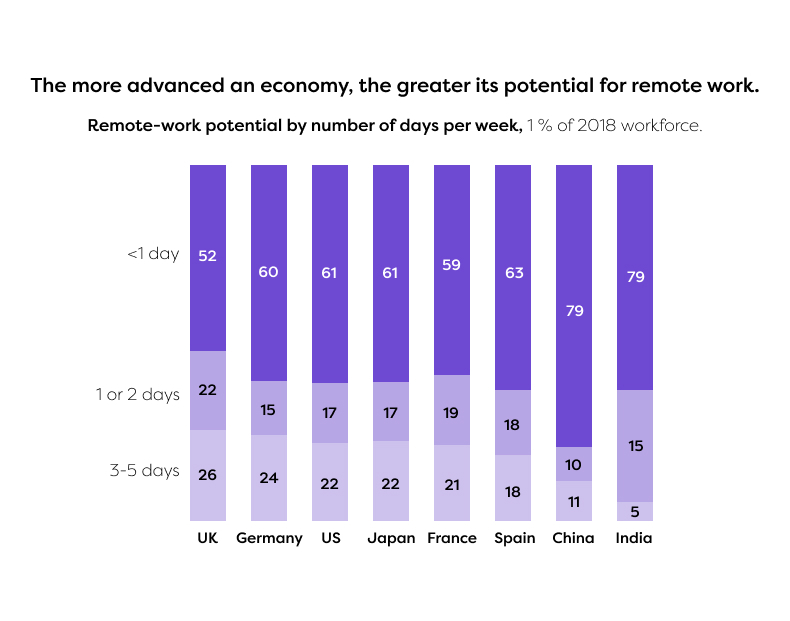Remote work is here to stay and here is why

Moving from one place to another for employment isn't something that has only come up in recent decades. It is a social trend that has existed for centuries. But all it took was a pandemic to turn this century-old tradition on its head.
Offices were emptied because of the pandemic (they gave an impression of a post-apocalyptic world).
Although it started as a preventive measure to control the spread of the virus, remote work didn't take a lot of time to emerge as the potential alternative to the age-old physical office approach.
That's probably the reason why the number of employees with remote jobs has doubled from before the pandemic.
A lot of other reasons and trends reaffirm the statement - "remote work is here to stay".
What we will learn in this blog:
- How remote companies have access to a larger pool of talent
- Financial benefits doe both companies and employees
- Growth of hybrid models of work
- How the gig economy will influence jobs?
How remote companies have access to a larger pool of talent
A large company situated in a big city might have a big pool of talented workforce at their disposal but it is nowhere near the abundance of talent available to remote teams operating from anywhere around the world.

A lot of times in the past knowledge workers were unable to work at a company just because they were required to relocate to the place where the company was located (especially if it was in a different country). But this isn't a concern anymore as they could work (remotely) for a company located anywhere in the world.
Financial benefits for both companies and employees
Remote work was also observed to be economical for both the employer and the employees. The cost of operating a physical office is huge even for companies with deep pockets.
From paying electricity bills to office rent to other recurring office expenses, opening an office used to( and will) scare businesses.
Now with the advent of remote work culture, they are able to invest the same money in more meaningful stuff like employee welfare schemes and still save a lot in operating expenses.
For employees too, remote work has resulted in huge savings and convenience.
As they are not required to stay in urban locations anymore, they are able to save a lot on house rent by moving to the suburbs.
Moreover, they will also save a lot of money and time that was previously spent on commute. So remote work is a win-win for both the employees and the employer.
Virtual meetings are going to permanently replace 20% of all business travels according to McKinsey's travel, logistics, and infrastructure practice.
Growth of hybrid models of work
Although remote work might not sound appealing to a lot of employees and employers, they are far from denying the fact that it is going to transform a lot of industries forever.
More and more companies are adopting a mix of remote and office work so that they can get the best of both worlds.
Almost 25% of the working population in developed economies would be able to work three to five days a week, according to McKinsey Global Institute. This is because a majority of the workforce in advanced economies is involved in the IT sector.
The above stat by McKinsey is true even for the IT sector of developing economies like India and China.

When it comes to software companies (especially startups), remote work is becoming a kind of norm as almost all of the operations in this industry can be done from home (or anywhere). It is also very budget-friendly for startups as they don't have to spend a lot on getting physical workspaces.
How the gig economy will influence jobs
The gig/freelance economy has been on the rise since the last decade and the growth of platforms like Upwork and Fiverr goes on to prove the same. A lot of businesses now hire remote professionals on a project basis.
This way, the gig economy normalizes the remote work culture both for the employee and the employer as both parties have some prior experience or at least an idea of how they can operate in a remote work setting.
Conclusion
Now that we are recovering from the pandemic and trying to move forward, a lot of people believe that they might have to move back to their cubicles. Well, it's true. A lot of companies have asked their workforce to move back to the office for they want to shift to what's normal.
But keep in mind that some job profiles fit remote work better than the others and a large part of the workforce being called back to the offices don't fit the remote work profile (yet).
Although remote or hybrid work structure is the future for most businesses, it doesn't hold true for other types of work and industry. Companies involved in logistics can never go fully remote and the same applies to education and healthcare.
But companies event these industries are promoting remote work for roles that can operate remotely without their productivity getting hampered.